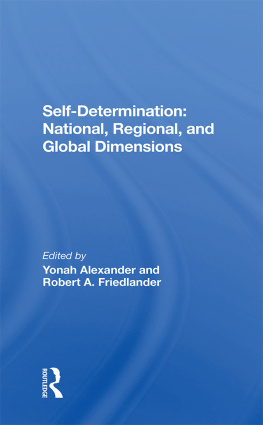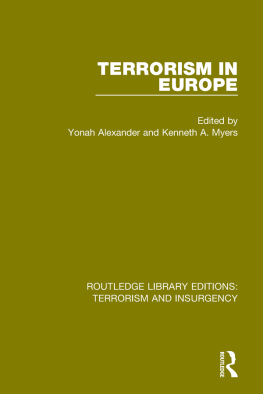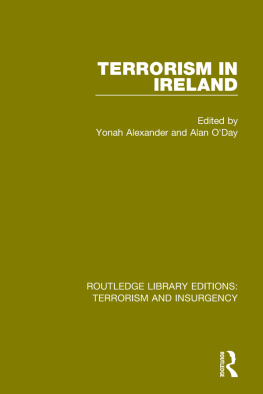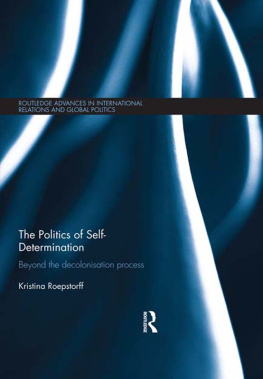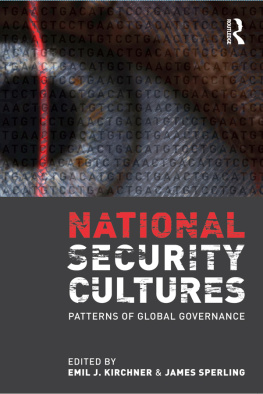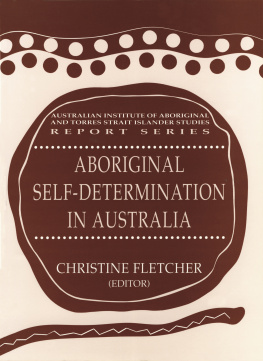Self-Determination
Other Titles in This Series
Terrorism: Theory and Practice, edited by Yonah Alexander, Paul Wilkinson, and David Carlton
International Terrorism: An Annotated Bibliography and Research Guide, Augustus R. Norton and Martin H. Greenberg
Victims of Terrorism, edited by Frank M. Ochberg
Terrorism and Global Security: The Nuclear Threat, Louis Ren Beres
Terrorism and Hostage Negotiations, Abraham H. Miller
Westview Special Studies in National and International Terrorism
Self-Determination: National, Regional, and Global Dimensions
edited by Yonah Alexander and Robert A. Friedlander
As part of a national and international revolutionary strategy, terrorism has introduced into the struggle for power within and among nations a new mode of violence in terms of technology, victimization, threat, and response. It has also affected our present concepts and perceptions of self-determination. One of the principal questions addressed in this volume is whether self-determination is a necessary precondition for peace, stability, and friendly domestic and international relations based on respect for human rights and fundamental freedoms. The authors also consider the future shape of the political map and focus on the dominant trends and realities of the issue of self-determination, with a view toward identifying consequences for contemporary society and offering explicit recommendations.
Yonah Alexander is professor of international studies and director of the Institute for Studies in International Terrorism at the State University of New York and a research associate at the Center for Strategic and International Studies, Georgetown University.
Robert A. Friedlander is professor of law at the Ohio Northern University College of Law.
Self-Determination: National, Regional, and Global Dimensions
edited by Yonah Alexander and Robert A. Friedlander
First published 1980 by Westview Press, Inc.
Published 2019 by Routledge
52 Vanderbilt Avenue, New York, NY 10017
2 Park Square, Milton Park, Abingdon, Oxon OX14 4RN
Routledge is an imprint of the Taylor & Francis Group, an informa business
Copyright 1980 Taylor & Francis
All rights reserved. No part of this book may be reprinted or reproduced or utilised in any form or by any electronic, mechanical, or other means, now known or hereafter invented, including photocopying and recording, or in any information storage or retrieval system, without permission in writing from the publishers.
Notice:
Product or corporate names may be trademarks or registered trademarks, and are used only for identification and explanation without intent to infringe.
Library of Congress Catalog Card Number: 80-65075
ISBN 13: 978-0-367-28703-0 (hbk)
To our parents
Contents
, Ray S. Cline
, Yonah Alexander and Robert A. Friedlander
, Jordan J. Paust
, Edgar S. Efrat
, John F. Murphy
, Natan Lerner
, Harold S. Johnson
, Thomas E. Hachey
, Ilya Levkov
, Ved P. Nanda
, Christopher C. Mojekwu
, Yoram Dinstein
, Yonah Alexander
, Robert A. Friedlander
, Seymour Maxwell Finger and Gurcharan Singh
, Harold S. Johnson and Baljit Singh
One of the major concepts in political theory and jurisprudence is self-determination. It advocates the idea that a homogeneous people has the "right" to determine its own destiny as a distinct sovereign nation or the "right" to maintain its own national traditions within a larger political entity. Yet, ever since the establishment of China in 1523 B.C. as the first recorded nation in history, the meaning of the basic concept has been highly controversial. Its validity as an absolute and legitimate "right" to be exercised in the political process within and among nations has been frequently challenged. In the twentieth century, self-determination became a dynamic issue as a consequence of its adoption as the moral foundation of peace by the League of Nations. Contrary to Wilsonian idealism, the reshaping of the map of Europe neither prevented World War II nor saved democracy.
Nevertheless, since the establishment of the United Nations, the principle of self-determination has been espoused with greater vigor. In the past thirty years, the world has seen numerous sovereignty changes: dependent areas that have received their independence; dependent areas that have been incorporated into independent entities; territorial transfers from one country to another; creation of new or changed political entities as a result of dissolution of sovereign governments. Ironically, many of these changes implemented in the name of self-determination have contributed to terrorism, guerrilla warfare, and transnational conflicts.
The question whether this doctrine is a force for stability or international chaos is extremely significant for the balance-of-power assessment in the years ahead. The unique value of this volume is that it analyzes the problem from national, regional, and global perspectives and thereby contributes to a better understanding of the complex issues involved.
Ray S. Cline
On October 13, 1975, at the World Peace Through Law Conference held in Washington, D.C., the president of the International Court of Justice proudly referred to the court's reaffirmation of the principle of self-determination as its greatest jurisprudential accomplishment. Self-determination has been a basic doctrine of the United Nations since the very beginnings of that international organization. Definitions vary somewhat, but self-determination is often considered to be the "right" of a "people" to shape their own political, economic, and cultural destinies.
Professor Michla Pomerance terms self-determination "a general prescription for doing justice." Professor Louis Sohn has called it "an idea that revolutionized the world." Yet critics of the self-determination concept declare that it is first and foremost a political weapon, inequitable in its application and unreasonable in its result. Confusion over the nature of the process, and misapplication of its meaning, have distorted self-determination in practice and weakened its potential resolutory role as a legal remedy. There are those who have argued that, through combined misunderstanding and misdirection, the self-determinative principle has been less conflict-resolving than it has been conflict-promoting.
Recent events in Southeast Asia, Southwest Africa, and the Middle East have once again inspired third-party appeals to implement an asserted right of self-determination in these politically volatile areas. Rebellion, civil war, and transnational conflict have been the traditional means by which dissident minorities have sought to end the dominion and control of dominant majorities. The legal-political process has frequently given way to the cult of force, but the claim of right by the repressed minority almost always has been the sameself-determination of peoples.
In December 1978, Dominica, the latest Caribbean island nation to gain its independence from Great Britain, became the 151st member state of the United Nations. Yet, the universality of the world organization is far from complete. Trusteeship territories as well as dependent peoples are continuously claiming the "inalienable right of self-determination" based upon the UN Charter, the two International Covenants on Human Rights, the Declaration on the Granting of Independence to Colonial Countries and Peoples, the twenty-fifth anniversary Declaration on Principles of International Law Concerning Friendly Relations and Cooperation, and countless other General Assembly and Security Council resolutions and declarations.

